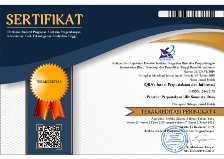Kemampuan Literasi Digital Siswa Berprestasi
Abstract
Abstract
The purpose of this research is to know the ability of digital literacy in students to high achievement in one of Jambi province's excellent school's MAN Insan Cendikia. This study used is a qualitative method with a phenomenological approach. Data analysis using Interpretative phenomenological Analysis. Participants were involved in the study with 4 outstanding students. The results describe issues digital literacy-related competence of students achieving in MAN Insan Cendikia Jambi are the ability to access information and knowledge on the internet, reading habits, literacy using video, e-learning, and literacy transformation. Also, the competence of digital literacy is related to motivation and high curiosity, competition, efficiency in literacy, and writing scientific work. Factors that affected the digital literacy capabilities of MAN Insan Cendikia Jambi students; First, the library facilities are complete and comfortable. Second, good facilities for technology. Third, The fast and numerous access internet. Fourth, external motivation. Fifth, school oversight.
Keywords: Digital, information, school, students, technology
Abstrak
Tujuan penelitian ini adalah untuk mengetahui kemampuan literasi digital pada siswa berprestasi di salah satu sekolah unggulan Provinsi Jambi yaitu MAN Insan Cendikia. Metode yang digunakan adalah metode kualitatif dengan pendekatan fenomenologi. Analisis data menggunakan Interpretative phenomenology Analysis. Partisipan yang terlibat dalam penelitian berjumlah 4 siswa yang berprestasi. Hasil penelitian menunjukkan bahwa kemampuan literasi digital siswa berprestasi di MAN Insan Cendikia Jambi merupakan kemampuan mengakses informasi dan pengetahuan lewat internet, kebiasaan membaca, literasi lewat video, elearning, dan adanya transformasi literasi. Selain itu kemampuan literasi digital juga berkaitan dengan motivasi dan rasa ingin tahu yang tinggi, kompetisi, efisiensi dalam literasi, serta penulisan karya ilmiah. Adapun faktor yang memengaruhi kemampuan literasi digital siswa berprestasi MAN Insan Cendikia Jambi, diantaranya; Pertama, sarana perpustakaan yang lengkap dan nyaman. Kedua, fasilitas teknologi yang bagus. Ketiga, jaringan internet yang cepat dan banyak. Keempat, motivasi eksternal. Kelima, pengawasan dari pihak sekolah.
Kata kunci : Digital, informasi, sekolah, siswa, teknologi.
Full Text:
PDF (Indonesian)References
Bawden, D. (2001). Information and digital literacies: a review of concepts. Journal of documentation, 57(2), 218-259.
Goulao, MDF.& Fombona. (2012). Digital Literacy and adults learners' perception: The case of asecond chance to University. Social and Behavioral Sciences 46 ( 2012 ) 350 - 355
Harari, Y.N. (2018). Homo Deus Masa Depan Umat Manusia (Y. Musthofa, Trans). Jakarta: Pustaka Alvabet
Javorsky, S.,& Horvath, R. (2014). Phenomenon of Digital Literacy in scope of European crosscurricular comparison. Procedia - Social and Behavioral Sciences, 143 ( 2014 ) 769.
Kurnianingsih, I., Rosini., & Ismayanti, N. (2017). Upaya peningkatan kemampuan literasi digital bagi tenaga perpustakaan sekolah dan guru di wilayah jakarta pusat melalui pelatihan literasi informasi . JPKM, Vol.3, No 1September 2017
Livingstone, S. (2004). The Chalengge of Changing Audiences: Or What is the Audience Reseacher to do in age of the internet? European Journal of communication, 19 (1), 117-127
Nouri, J. (2019). Students Multimodal Literacy and Design of Learning During Self-Studies in Higher Education. Tech Know Learn (2019) 24:683-698
Jones, RH. & Hafner, CA. (2012). Understanding digital literacies. London and New York: Routledge Taylor & Francis Group
Pradana, Y. (2018). Atribusi kewargaan digital dalam literasi digital. UCEJ, Vol. 3 No. 2, Desember 2018, Hal. 168-182
Pratama, W.A., Hartini, S., & Misbah. (2019). Analisis Literasi Digital Siswa Melalui Penerapan E-Learning Berbasis Schoology. Jurnal Inovasi dan Pembelajaran Fisika, Volume 6, No. 1, Mei 2019, hal. 9-13.
Rombousek, V., Stipek, J., & Vankova, P. (2016). Contents of digital literacy from the perspective of teachers and pupils. Social and Behavioral Sciences 217 ( 2016 ) 354 - 362, doi: 10.1016/j.sbspro.2016.02.101
Shariman, TPNT., Razaq, NA., & Noor, NFM. (2012). Digital literacy competence for academic needs: an analysis of malaysian students in three universities. Social and Behavioral Sciences 69 ( 2012 ) 1489
, doi: 10.1016/j.sbspro.2012.12.090
Tomczyk, L. (2020). Digital literacy and e-learning experiences among the pre-service teachers data. Data in Brief, 32 (2020) 106052
Velez, AP.,& Zuazua, II. (2017). Digital literacy and cyberconvivencia in primary education. Procedia - Social and Behavioral Sciences 237 ( 2017 ) 110 - 117. doi: 10.1016/j.sbspro.2017.02.050
Velez, AP., Olivencia, JJL.,& Zuazua, II. (2017). The role of adults in children digital literacy. Procedia - Social and Behavioral Sciences 237 (2017) 887 - 892, doi: 10.1016/j.sbspro.2017.02.124
DOI: http://dx.doi.org/10.30829/iqra.v18i1.14748
Refbacks
- There are currently no refbacks.
Copyright (c) 2024 Agung Iranda

This work is licensed under a Creative Commons Attribution-ShareAlike 4.0 International License.
IQRA': JURNAL PERPUSTAKAAN DAN INFORMASI
Perpustakaan Universitas Islam Negeri Sumatera Utara
Jalan Willem Iskandar Pasar V Medan Estate
20371
Medan - Sumatera Utara






